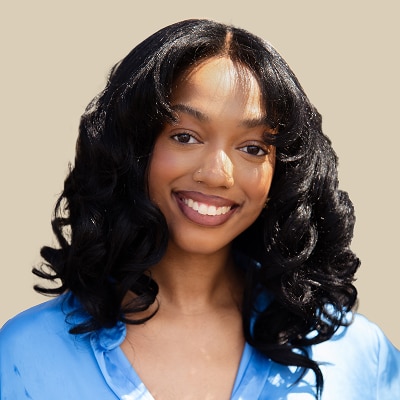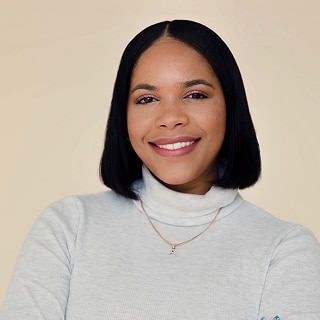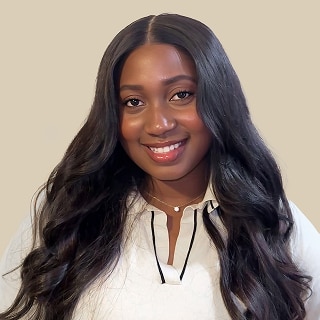
Lauren
What does Black History Month mean to you?
Black History Month means celebrating how far we’ve come as a community and looking forward to where we’re going. I love our culture—everything from the diverse art mediums to the shared connections we all have as a community.
How do you observe or celebrate the month?
I usually observe it by attending various Black History Month events with friends or family.
How do you believe Black History Month contributes to fostering understanding and unity in society and at work?
I believe black history should be recognized year-round because our culture is a powerful force. Black History Month provides a moment to pause, focus and shine a bright light on how our culture informs and influences the entire world, even at work.
What changes or progress would you like to see in the future regarding the representation of Black voices and culture in the beauty industry?
The changes I’d like to see in terms of representation of Black culture in the beauty industry involve showcasing more examples of our diversity. I attended the illustrious Howard University, where this diversity was incredibly evident and refreshing. Black people are not a monolith—the variety of styles, attitudes and upbringings is what makes us uniquely different yet connected at the same time.

Ashani
What does Black History Month mean to you?
Black History Month is a celebration of resilience, creativity, and the groundbreaking contributions Black individuals have made and continue to make every day. As someone in the beauty industry, it’s a chance to reflect on the immense impact Black culture has had on trends, standards and innovation, especially in fashion and beauty—everything from bold hairstyles to skincare rituals rooted in tradition. It’s also a reminder to actively honor that legacy year-round by supporting Black-owned brands, celebrating diversity and pushing for inclusivity in every corner of our industry. It’s not just history—it’s the foundation of so much of what we see and do every day.
How do you observe or celebrate the month?
Most of my celebrations tend to happen within community or by giving back. I volunteer in spaces that uplift Black communities such as mentoring or participating in educational events geared towards celebrating Black culture, history and achievements. I also support many Black owned brands purchasing products to support black-owned businesses and entrepreneurs.
How do you believe Black History Month contributes to fostering understanding and unity in society and at work?
Black History Month creates opportunities and space for education, awareness and open dialogue around Black culture and history. This time encourages people to learn about the contributions, struggles and achievements of Black individuals which helps to break down stereotypes and biases. This opens the door for people from other races, cultures and walks of life to have a deeper understanding and cultural appreciation towards Black culture and promotes inclusivity and respect for culture in the workplace.
What changes or progress would you like to see in the future regarding the representation of Black voices and culture in the beauty industry?
There are so many ways we can enhance Black History Month and amplify Black voices in the beauty space. The two main changes I will always advocate for is to ensure there is year-round representation and not just in February and implement diverse leadership in the beauty industry. When there is consistent amplification of Black voices year-round this ensures that Black voices, brands and innovations are constantly celebrated and integrated into product development and launches, campaigns and storytelling. When it comes to diverse leadership, we need to ensure there are Black voices being heard in the decision-making process to ensure there is authentic representation.

Tanisha
What does Black History Month mean to you?
Black History Month is a time to honor the resilience, achievements and cultural heritage of Black people in the US. It’s an opportunity to reflect on the progress made and the challenges we continue to face. It’s a reminder of learning from the past to build for a more inclusive future. Black History Month also serves as a time of celebration and pride. Black culture has impacted many sectors, including beauty, fashion, music and art. Black History Month is a period to acknowledge and take pride in the contributions that have shaped society.
How do you observe or celebrate the month?
During Black History Month I enjoy attending events such as panel discussions, exhibitions and community gatherings. I dedicate time to educate myself about influential Black figures whose stories may not be widely known. Beyond BHM, I continuously support Black-owned business, artists and creators.
How do you believe Black History Month contributes to fostering understanding and unity in society and at work?
Black History Month sparks education and dialogue. It gives us the opportunity to learn about the contributions and experiences of Black people. In the workplace, it promotes cultural awareness and fosters an environment where diversity is celebrated. By acknowledging Black history, we challenge stereotypes and biases, paving the way for greater empathy and collaboration within the organization.
What changes or progress would you like to see in the future regarding the representation of Black voices and culture in the beauty industry?
While the beauty industry has come a long way, there is still significant progress to be made. I envision a future where diversity is not a trend but a standard. Consumers will be able to go to any brand and find a match. They will see authentic representation in marketing and feel included. It’s crucial to amplify black voices, ensuring creators, business owners and professionals have equal opportunities and visibility.
